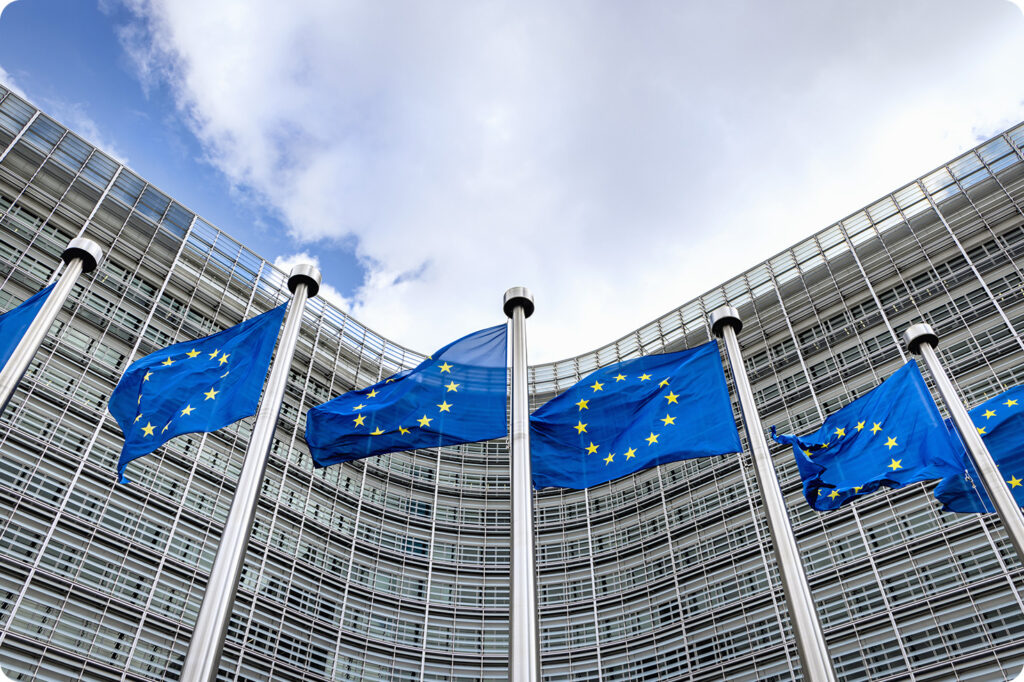The top five climate risk and disclosure stories this week.
Want access to deeper insights and curated climate news? Request a demo of our solution today.
Record-breaking September temperatures raise climate alarm

Global average temperatures in September smashed previous records, with one climate scientist describing them as “absolutely gobsmacking bananas.”
September’s average temperature of 16.4°C surpassed the former peak by over half a degree celsius, marking the largest monthly margin ever observed. The unprecedented heating is attributed to both human-induced climate change and the climate pattern El Niño, a natural phenomenon in which layers of warm water rise up in the Pacific Ocean, adding more heat and moisture to the atmosphere.
The European Union’s Copernicus Climate Change Service estimates that this year’s annual average temperatures will be approximately 1.4°C above pre-industrial levels, bringing the planet closer to the critical 1.5°C warming benchmark.
In September, heat records soared in many countries, including France, Germany, and Poland. The UK sweltered under its joint hottest September since records started in 1884. Scientists say the spike in global temperatures is likely to catalyze intense heat waves and devastating floods.
EU launches carbon border tax

The European Union (EU) has started to implement a first-of-its kind carbon border tax for climate-harming foreign imports.
Launched Sunday, the Carbon Border Adjustment Mechanism (CBAM) is meant to combat “carbon leakage.” This occurs when EU-based companies shift climate-polluting activities to other countries that have looser environmental protections or that replace EU products with more carbon-intensive imports.
CBAM will initially apply to a small set of goods, including cement, iron and steel, aluminum, fertilizers, electricity, and hydrogen. When fully phased in, CBAM will cover more than 50% of the emissions generated by sectors that belong to the Emissions Trading System (ETS), the EU’s internal carbon market.
In this first phase of launch, CBAM requires EU importers to disclose the greenhouse gas emissions linked with the carbon-intensive goods that they bring into the bloc. From 2026 onward, importers will need to buy certificates to cover these emissions.
“CBAM is not about trade protection. It is about protecting the EU’s climate ambition – and seeking to raise the level of climate ambition worldwide,” European Economy Commissioner Paolo Gentiloni told Reuters.
Asset owners embrace ESG, focus on climate — survey

Asset owners continue to prioritize environmental, social, and governance (ESG) factors in their investments, with 67% of respondents in a recent survey believing that ESG has become more material to investment policy over the past five years.
Morningstar’s second annual asset owners survey spanned 11 countries and covered 500 asset owners, including pension funds, insurance general accounts, outsourced chief investment officers, and family offices. Despite the challenges faced with ESG implementation, allocations toward ESG strategies are increasing, particularly in relation to climate change and the net-zero transition.
The percentage of asset owners with over half of their total assets reflecting ESG considerations increased to 34% in 2023, compared with 30% in 2022. Climate change and the transition to net-zero emissions are the top environmental factors influencing asset owners’ decision-making, followed by energy management and sustainable food and agriculture. European asset owners lead the way in ESG integration, with an average of 46% of their assets considering ESG factors, compared to 41% in APAC, and 36% in North America.
Despite the growing importance of ESG, asset owners still face challenges, including regulatory confusion, market environment issues, and the need for improvements in ESG data, ratings, indexes, and tools. The impact on returns is the leading challenge for pursuing ESG strategies.
The issue of greenwashing — misleading tactics used to overstate a sustainability commitment — remains a concern among asset owners. However, they see it as a less severe problem than in the past. Fifteen percent of respondents do not view greenwashing as a problem, up from 11% in 2022, while the proportion who view it as a moderate or major problem has declined.
NGFS unveils short-term climate scenarios

The Network for Greening the Financial System (NGFS) published a conceptual note on short-term climate scenarios, which look at imminent climate risks’ threat to the financial system.
The five scenarios, spanning three to five years, will help central banks and financial supervisors understand the broader financial repercussions of transitioning to a net-zero economy and coping with major natural disasters.
“The impacts from recent extreme weather events on the real economy and recent tensions in energy markets, are reminders that climate change and the dependence on traditional energy sources are already causing considerable disruptions around us, “ said NGFS chair Ravi Menon. “By introducing short-term scenarios, the NGFS aims to provide central banks and supervisors with a tool to better understand the implications of climate risks on near-term macro-financial developments, the possible transmission channels and as well as the trade-offs feeding into the monetary policy decision-making process.”
The NGFS has already released three versions of long-term climate scenarios, which sketch out possible futures up to 2050. However, these scenarios don’t shed light on the short-term transition shocks and climate-driven natural disasters that could upend financial institutions over the next few years. By working on short-term scenarios, the NGFS intends to develop a more dynamic understanding of the financial system’s readiness for sudden climate policy shifts, yo-yoing market sentiment, and rapid technological change.
The five outlined scenarios are: “Highway to Paris,” which imagines the implementation of an ambitious climate mitigation agenda; “Green Bubble,” which is characterized by an overinvestment in climate-friendly markets; “Sudden Wake-Up Call,” which hypothesizes a disorderly transition; “Low Policy Ambition and Disasters,” where acute physical risks escalate; and “Diverging Realities,” which reflects a potential uptick in climate-driven catastrophes in the developing world, disrupting the global transition.
The NGFS says institutions and their supervisors can use short-term scenarios for climate stress-testing and to capture potential systemic risks.
Greenwashing surges in Europe and the Americas — study

Greenwashing risks are on the rise and are accelerating particularly in Europe and the Americas, with the banking and financial services sectors being most affected, an analysis by ESG data provider RepRisk shows.
The study revealed that both public and private companies are increasingly linked to misleading environmental and climate communications. In the last year, one in four climate-related ESG risk incidents was associated with greenwashing, up from one in five in 2022. Climate-related greenwashing incidents in the banking and financial services sectors also surged by 70%, compared to the previous year.
In the last 12 months, 1,850 companies were linked to a risk incident involving misleading climate communication, with 63% encountering the issue for the first time. Private companies also faced substantial risks, with 73% of greenwashing incidents involving at least one private firm. Within the financial sector, over half of greenwashing incidents were connected to institutions’ relationships with fossil fuels or oil and gas companies. Many investors are now demanding these relationships to change so as to lower their greenwashing risks.
RepRisk says the rise in greenwashing incidents is a function of the burgeoning demand for sustainable products and companies, as well as the belief that strong sustainability credentials can confer a competitive advantage. RepRisk says it expects incoming regulations and frameworks to ramp up the scrutiny of companies’ climate and sustainability claims in the near future.

